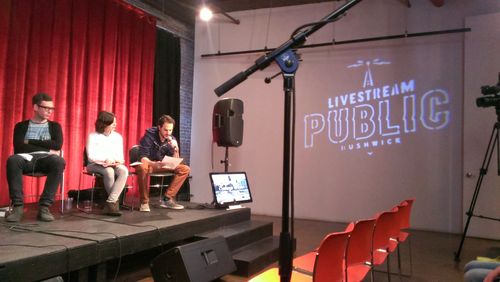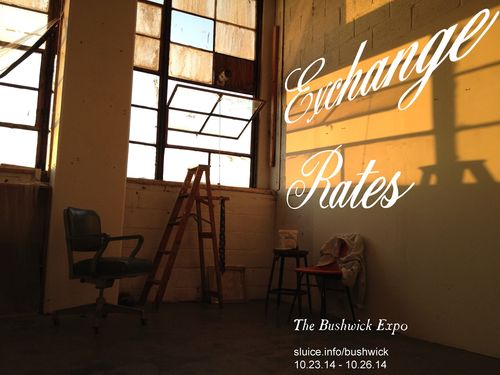In the spirit of the transnational exhibition "Exchange Rates Bushwick," the artist/translator/organizer Paul D'Agostino hosted "Renderings: Encounters & Translations" last Sunday at Livestream Public in Brooklyn. Now, thanks to Livestream, we can watch the full "series of readings and presentations of translations rendered, translations encountered, translations variably treasured."
Dara reads Kafka at 25:45 & Valery at 1:07:55. She is joined on stage by Paul, Matthew Rossi, Alice Lynn McMichael, Andrea Monti, Todd Portnowitz, and Cecco the Turtle.
Les PasTes pas, enfants de mon silence,Saintement, lentement placés,Vers le lit de ma vigilanceProcèdent muets et glacés.Personne pure, ombre divine,Qu'ils sont doux, tes pas retenus!Dieux!... tous les dons que je devineViennent à moi sur ces pieds nus!Si, de tes lèvres avancées,Tu prépares pour l'apaiser,A l'habitant de mes penséesLa nourriture d'un baiser,Ne hâte pas cet acte tendre,Douceur d'être et de n'être pas,Car j'ai vécu de vous attendre,Et mon coeur n'était que vos pas.
Here is Dara's translation of "The Steps"
The Steps
Your steps, children of my silence,
Sacred, slowly placed,
Proceed icy and silent
To the bed where I wake.Body pure, spirit divine,
How sweet, your discreet steps!
God! Every gift I find
Appears on naked feet!If, with your advancing lips
You prepare to appease me,
Consuming my thoughts
With the food of your kiss,Do not hasten this tender act,
So sweet to anticipate,
Because I lived waiting for you,
And my heart was the steps you take.
And here is Paul D'Agostino's translation of the same poem, which he calls "Footsteps"
FootstepsSaintly, slowly placedAre your footsteps, those quiet kids,Unto the bed where I lie awake,They approach with muted skids.Holy shade, person so pure,Your paces so soft and sweet!Dear god, the gifts I conjureComing to me on those bare feet.And if, upon your lipsYou pucker at their tipsThe nourishment of your kissTo sate my mind's hungered fits,Let it be not an act of swiftness,Sweetness of being and being not,For I have lived to await your footstepsThat give form and beat to my heart.
For commentary, here is James's coverage of the event in 140 characters or less
Next @Livestream! @daramandle @postuccio #ExchangeRatesBushwick READING: Encounters & Translations http://t.co/ajUJgIYwaT @TwoCoats
— James Panero (@JamesPanero) October 26, 2014
The first reader now on stage @Livestream @postuccio @daramandle #ExchangeRatesBushwick http://t.co/ajUJgIYwaT pic.twitter.com/UzZy2m4aS4
— James Panero (@JamesPanero) October 26, 2014
The translators arrive @Livestream @postuccio @daramandle #ExchangeRatesBushwick http://t.co/ajUJgIYwaT pic.twitter.com/zTWmm6MKTZ
— James Panero (@JamesPanero) October 26, 2014
Up first Andrea Monti @MicroscopeEvent reads Dino Campana's Canti Orfici in Italian. Says can't be translated #ExchangeRatesBushwick
— James Panero (@JamesPanero) October 26, 2014
Matthew Rossi reads Italo Calvino on multiplicity #ExchangeRatesBushwick
— James Panero (@JamesPanero) October 26, 2014
.@daramandle reads her translation of part of "Up in the Gallery" by Kafka, two paragraph-length sentences
— James Panero (@JamesPanero) October 26, 2014
Alice Lynn McMichael reads posthumously published Tolkien translation of Beowulf #ExchangeRatesBushwick
— James Panero (@JamesPanero) October 26, 2014
Hot turn @Livestream with three translations of Cecco's s'i fosse foco http://t.co/PTusaGfDjY. Todd Portnowitz, particularly explosive
— James Panero (@JamesPanero) October 26, 2014
Up now translations by @postuccio & @daramandle of The Steps by Paul Valery #ExchangeRatesBushwick http://t.co/cz88H4GPHH
— James Panero (@JamesPanero) October 26, 2014

